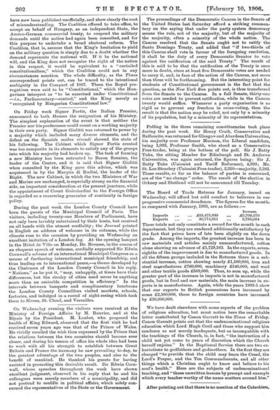On Wednesday evening the visitors were received at the Ministry
of Foreign Affairs by M. Rouvier, and at the Elysee by the President. M. Loubet, who proposed the health of King Edward, observed that the first visit be had received seven years ago was that of the Prince of Wales. He vividly recalled the wish then expressed by the Prince that the relations between the two countries should become ever closer, and during his tenure of office his whole idea had been to work with all his strength to establish between Great Britain and France the harmony he saw prevailing to-day, to the greatest advantage of the two peoples, and also to the benefit of mankind. He thanked his guests for having assisted in promoting this desirable result. Sir Edwin Corn- wall, whose speeches throughout the week have shown eicellent judgment, observed in his reply that he and his colleagues were merely members of a municipality, and did not pretend to meddle in political affairs, which solely con- cerned the representatives of the State or the Government. The proceedings of the Democratic Caucus in the Senate of the United States last Saturday afford a striking commen- tary on the saying that under the party system democracy means the rule, not of the majority, but of the majority of the majority, often a minority of the whole nation. The Caucus resolved that the Senate ought not to ratify the Santo Domingo Treaty, and added that "if two-thirds of this Caucus shall vote in favour of the foregoing resolution, it shall be the duty of every Democratic Senator to vote against the ratification of the said Treaty." The result of this is said to be that the ratification of the Treaty is once more in doubt, since at least five Democratic votes are needed to carry it, and, in face of the action of the Caucus, not more than three will be forthcoming. But the interesting point for students of Constitutional government is the fact that the question, as the New York Sun points out, is thus transferred from the Senate to the Caucus. In a full Senate, thirty-one votes are needed to prevent ratification, while in the Caucus twenty would suffice. Whenever a party organisation is so rigid as to prevent any freedom in cross-voting, then the result is that the nation may be ruled, not only by a minority of its population, but by a minority of its representatives.










































 Previous page
Previous page